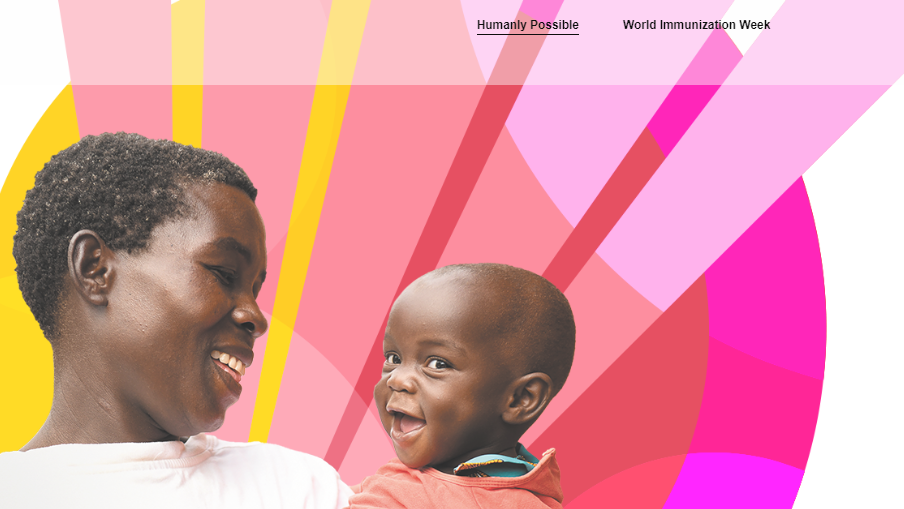World Immunization Week 2024 kicks off: Humanly Possible!
'Humanly Possible' is the theme chosen for WHO's World Immunisation Week 2024, celebrated every year from 24 to 30 April. This year's date is particularly significant because, besides coinciding with 'World Meningitis Awareness Day', it also falls on the 50th anniversary of the 'Expanded Programme on Immunization' (EPI), an initiative launched in 1974 by the World Health Organization (WHO) to ensure equal access to vaccines as a life-saving tool for in childhood and beyond, regardless of geographic location or socio-economic status.

Each year, World Immunization Week (WIW) honours the extensive work carried out through joint action by the Member States of the European Region, with the involvement of all WHO National Offices and partners, Ministries of Health, Professional and Parental Organisations, Local Health Authorities, Departments of Prevention and Public Health of national and international territories, who, together with all citizens, carry out important training, education and awareness-raising activities aimed at informed adherence to vaccination programmes.
The goal of the initiative is to help sustain public demand and provide political support for vaccination in the global health landscape, through advocacy and health education activities, targeted communication and counselling, with the ultimate aim of increasing vaccination coverage by communicating the importance of vaccination among parents, operators, health professionals, policy makers and the media.
In these years of intense activity in which Public Health around the world has worked and continues to work with perseverance and commitment to raise awareness of the importance and essentiality of vaccinations and to increase vaccination coverage, the WIW has become a widely recognised event, within which the 'World Meningitis Awareness Day' also holds indisputable significance.
This important occasion, in fact, contributes to raising awareness of meningitis as a life-threatening infectious disease which can cause permanent disability.

Meningococcal meningitis, also known as epidemic cerebrospinal meningitis due to its potential diffusivity, is an infectious, acute and contagious disease caused by Neisseria meningitidis, which, together with Streptococcus pneumoniae, Listeria monocytogenes and Haemophilus influenzae type b, causes 80% of bacterial forms of meningitis.
In particular, N. meningitidis penetrates via the air and settles in the nasopharyngeal mucosa where it can remain for a long time without giving rise to clinical manifestations: this results in the status of a healthy carrier, which can last from a few weeks to a few months.
However, if the host is receptive, i.e. not immunised and with permanent or transient conditions that limit its immune response, after an incubation period of 2-10 days, the micro-organism may cause invasive disease. In the most severe forms (5-20% of cases), sepsis (often fulminant) is observed, characterised by the appearance of petechiae, which may be followed by acute adrenal insufficiency. Frequently, the central nervous system (CNS) or other organs such as the lung (5-15%) are affected, with a lethality rate of around 13%, proportional to the virulence of the strain causing the disease.
Recent epidemiological data from the National Surveillance System of the Ministry of Health document an incidence of meningococcal meningitis in Italy in 2021 of 0.04 per 100,000 inhabitants, 0.81 per 100,000 inhabitants for the form due to Streptococcus pneumoniae and 0.11 per 100,000 inhabitants for those due to Haemophilus influenzae and Listeria monocytogenes. In addition, the latest report, referring to 2022, states that there were 57 meningococcal cases in our country, whereas 25 and 74 cases were reported in 2021 and 2020, respectively. Also in 2022, 1,026 pneumococcal meningitis cases were reported (in 2021 and 2020, 489 and 501 respectively). As for haemophilus cases, 188 were reported throughout the country in 2022. This figure is up from the cases diagnosed in the two previous years: 76 in 2020 and 68 in 2021.
Once again, vaccination proves to be the only true life-saving weapon against infection and disease sequelae.

Tetravalent vaccines consisting of conjugated polysaccharide antigens for serogroups A, C, Y, W135 and two different protein vaccines for serogroup B are currently available against meningococci. The tetravalents are administered intramuscularly in single-dose form and confer 90% protection in children from 2 years of age and adults. However, the duration of immunity is not permanent, and recent recommendations indicate risk-dependent booster shots (booster shots at school age and in adolescence for those who were vaccinated in childhood, for individuals with diseases that expose them to a higher risk, or for individuals at higher risk - healthcare workers, travellers to areas with a higher incidence).
For serogroup B, universal vaccination of newborns is envisaged with one of the two protein vaccines currently available and administered from 3 months of age with a 2+1 schedule. The B vaccines are both recommended at 2 doses also for adolescents and all subjects at increased risk. Given the epidemiological dynamism of meningococci, the recommendation is to cover the 5 serogroups for which vaccines are now available (A,B,C,W135,Y), thus with both a tetravalent A,C,W135,Y and a B. Pentavalent A,B,C,W135,Y vaccines will also be available soon.
In this regard, WHO, with global partners and experts involved in meningitis prevention and control, led the development of a Global Road Map which defines the implementation of timely strategies to eradicate meningitis by 2030, involving hundreds of experts, Member State representatives, partners, civil society organisations as well as private sector representatives, through multidisciplinary, iterative and comprehensive consultations.
The Road Map sets out a global vision for 2030 'Towards a Meningitis-Free World', aiming to achieve three important goals:
1. Elimination of bacterial meningitis epidemics;
2. Reduction of 50% of bacterial meningitis cases and 70% of related deaths through mass vaccination campaigns;
3. Reduction of disability and improvement of quality of life after meningococcal disease.
In addition, the interconnected actions to be implemented to achieve the objectives are set out:
- Development of new vaccines: achieving high immunisation coverage and improving prevention strategies in response to epidemics;
- Diagnosis and treatment: focusing on rapid confirmation of meningitis and optimal disease management;
- Improvement of surveillance systems: with a view to improving prevention and care;
- Care and support for people with meningitis: early diagnosis, access to treatment and support for the after-effects of the disease;
- Advocacy and engagement: drafting national plans, right to prevention, care and aftercare services.

Moreover, this year's World Immunisation Week will mark 50 years since the introduction of the Expanded Programme on Immunisation (EPI), which was established in 1974 by WHO and represented a pivotal moment in the history of Public Health saving millions of lives globally every year.
Since then, major milestones have been achieved: vaccination coverage for diphtheria-tetanus and pertussis in childhood has increased from 5 to 85%; only five years after the introduction of EPI smallpox was eradicated; the geographical spread of wild poliovirus (the aetiological agent of poliomyelitis) has been reduced to just two countries; and the threat of many lethal and/or debilitating infectious diseases has drastically decreased.
Ongoing innovation in the field of immunology, moreover, has led to the development of vaccines capable of protecting against even more diseases, opening up the possibility in the European region of eliminating hepatitis B and cervical cancer in the near future.
Nevertheless, the decline in vaccination rates in some countries of the European Region between 2020 and 2022 highlights the vulnerability of our success. In the past three years, more than 1.8 million children in the WHO European Region have missed measles vaccination. The consequence is a 60-fold increase in the number of measles cases in 2023 compared to 2022. Of no less importance are growing conflicts, economic downturns and the Vaccine Hesitancy phenomenon, which represent just some of the threats to efforts to reach these children. As a result, the world is witnessing sudden epidemics of diphtheria and measles that, until now, Public Health had kept largely under control. Although global vaccination coverage is acceptable, with 4 out of 5 children fully covered, there is still much to be done.
In this context Vaccinarsinsardegna.org, embodying the principles on which all health promotion initiatives are based, and fully in line with the topics discussed during this important week dedicated to vaccination prophylaxis, today emphasises even more firmly the importance of global action to raise awareness and promote preventive vaccination, and urges everyone to adhere to vaccination programmes. Useful data and addresses are available on our website at https://www.vaccinarsinsardegn....
Furthermore, users are invited to stay connected to our site for future updates that will be published during the WIW.



